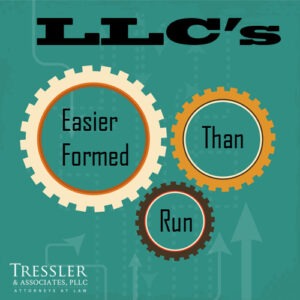Technology and the internet have streamlined so many “official” processes that used to require hardcopy forms, the antiquated postage stamp, and worst of all- actual trips to and long waits inside government buildings. This is true for the creation of a limited liability company (“LLC”) in Tennessee. Thanks to an intuitive and easily navigable interface, the Tennessee Secretary of State’s website will allow you to create your own LLC (or Corporation or Partnership) with basic information and a credit card in less than 15 minutes’ time. The process is incredibly, perhaps deceptively, simple.
This is by no means a criticism of the online formation process; the website displays the requisite legal notices and makes the process more accurate and efficient. However, the ease with which an LLC can be created may also downplay the responsibilities of running the entity to new or prospective “Members” (LLC owners). It is not uncommon that we receive calls from Members seeking an explanation of the “administrative dissolution” of their company. Many assume that unless the LLC is conducting certain business or making money, there is nothing that needs to be done. Unfortunately, this is not the case.
Generally, there are two main culprits of administrative dissolution in these circumstances. The first is the annual report. Every LLC must file an annual report and pay an annual fee. These are usually due April 1 for the previous calendar year. The annual report is simple, and is predominantly concerned with any changes to the membership (ownership), registered agent, or address of the LLC. The annual fee is calculated in the same manner as the initial formation payment ($50/Member, with a $300 minimum and a $3,000 maximum). The report and payment can both be submitted online.
The second culprit is the Franchise and Excise Tax, which is imposed on nearly every registered entity in Tennessee, save for a select group which may qualify for an exemption. Franchise and Excise Tax is based on net worth as of the close of the year, but a minimum $100 payment is due annually, regardless of the LLC’s worth (or lack thereof). In order to pay this tax, the LLC must first register with the Tennessee Department of Revenue. This can also be done online, but the process is notably trickier than LLC formation.
The government websites referenced above both offer great resources and downloadable guides for anyone willing or interested in getting more information. The problem seems to be that some DIY LLC owners are unaware of additional requirements until after it is too late. Considering that forming an LLC is equivalent to creating a “person” in the eyes of the law, it only seems fitting that there should be some upkeep involved. Consulting a business attorney about LLC formation is the best route (unsurprising, coming from a business attorney), but to anyone looking to create an LLC, educating yourself on the requirements at the start can save a great deal of time, hassle, and money down the road.
To learn more about how we can assist you with your Business Legal Services Contact Us Here or Call Us 615.444.2345



